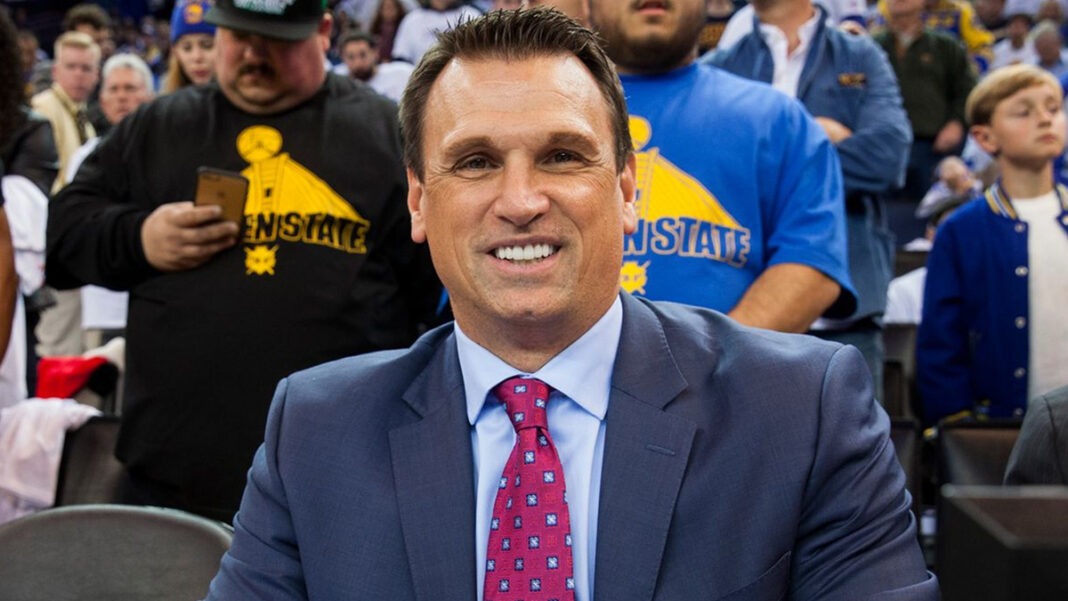Barrett Media produces daily content on the music, news, and sports media industries. To stay updated, sign up for our newsletters and get the latest information delivered straight to your inbox.
After the Boston Celtics hoisted the Larry O’Brien Trophy victorious as champions of the NBA, the sports media industry was focused on conversations surrounding the future of live game broadcasts amid consequential rights negotiations. While these meetings resulted in 11-year agreements with The Walt Disney Company (ESPN/ABC), Comcast (NBC/Peacock) and Amazon (Prime Video) reportedly worth a collective $77 billion, these contracts do not begin until the 2025-26 season.
As this was transpiring over the summer, Tim Legler observed that there was a lack of feedback and conversations with his agent ahead of the expiration of his contract. Legler, an NBA analyst for ESPN across game coverage and studio programming, had not gained clarity about his situation and later discovered that the company was engaging in a substantial restructuring of its content organization.
Burke Magnus, the president of content at ESPN, announced the new management configuration in late August, altering the responsibilities of various personnel in an effort to ensure the continued long-term success of the outlet. Although Legler had worked at ESPN for 24 years and demonstrated an ability to thrive through content innovation and technological development, he was now negotiating under the modified outline.
Over the years, Legler’s contracts had usually commenced and concluded in mid-October, concurrent with the start of the NBA season, but discussions about an extension would typically ensue five to six months prior. The timing coincided with the NBA Playoffs, oftentimes when Legler is his busiest and is appearing across studio programming to break down the latest action.
“It makes sense, and I never want to get deep into the summer when everybody kind of goes away for the summer from the NBA, and now I got to go all summer and have this doubt in my mind,” Legler said. “I’ve got a family – these things are important to me. This year was different because there was this reorganization coming that none of us really knew about, so it was very quiet [in] April, May, June, July.”
Once the enigma of the ESPN content structure and NBA media rights deal diminished in scope, the company met with Legler pertaining to his contract six weeks ahead of its expiration. At the beginning of their meeting, he expressed the impending nature of his deal and how he had never gone this late without a resolution. ESPN management informed Legler that he was of value to the network and considered a priority, divulgement that he felt rendered reaching an agreement on a new contract more likely.
“You just want to hear that they get you, they value you, they respect you and you are a big part of their plan going forward,” Legler said. “That’s all I needed to hear, and from that point on, I kind of knew where this was going to go, and then it was just a matter of working out all the details.”
One of the key points Legler communicated was a desire to become a regular game analyst without giving up his studio work. While he had previously called games on radio and television, he had not been utilized within the commentary lineup as frequently in recent years, demonstrating his value to bringing comprehensive analysis and breakdowns across the studio shows. Throughout the process, Legler remained realistic and thought about other opportunities in the marketplace should the conversations prove fruitless, viewing his aspiration as an imperative aspect of a deal. Once it became apparent that ESPN would agree, the two sides swiftly worked to draft and finalize an agreement.
“Other than being a player, it’s the only real job I’ve ever known is being in media and really being at ESPN, really from the time I retired from the league,” Legler said. “So, it’s family to me, it’s a second home to me and I wanted to stay there desperately, but I also very much wanted to expand my role and to do something that I think my skillset lends itself to, which is to be a game analyst.”
Longtime ESPN NBA game analysts Mark Jackson and Jeff Van Gundy were affected by corporate layoffs last year when The Walt Disney Company sought to eliminate $5.5 billion in costs as it reorganized its business under three core segments. Play-by-play announcer Mike Breen, who has called a record 19 NBA Finals, received a contract extension a few months later and started working with new partners Doris Burke and Doc Rivers. At the halfway point of the new season, the Milwaukee Bucks hired Rivers as its head coach, leaving a vacancy in the broadcast booth.
JJ Redick, who was working with Ryan Ruocco and Richard Jefferson in the secondary broadcast booth, was added to the lead team and subsequently called the NBA Finals. Eight days after the NBA Finals concluded, the Los Angeles Lakers announced that it had hired Redick as its 29th head coach in franchise history. Rather than entering the new season with a new analyst, reports have indicated that ESPN is exploring numerous potential configurations, one of which could include Legler. Although Legler is surmised to be up against competition both within the existing ESPN talent roster and from outside entities, he is focused on growing with each outing and highlighting the teams.
“These aren’t random acts that you’re watching of athletic ability and greatness,” Legler said. “There’s a lot that goes into it psychologically, athletically [and] schematically, and I try to do that in as concise a way as I can that makes you understand better what you’re watching, either going forward in that particular game or as an NBA fan in general the rest of the season, and hopefully the rest of your life watching basketball.”
Upon the completion of calling a game, Legler reaches out to Mike McQuade, who was named the executive vice president of sports production under the reorganization, to inquire about his thoughts. McQuade, a 37-year veteran of ESPN, is someone who Legler trusts with his discerning feedback. In addition to familiarizing himself with the next two teams and reviewing action around the league, Legler ensures he implements McQuade’s suggestions into his repertoire before returning to the microphone.
“I just think that was one of the smartest things ESPN’s done in a long, long time putting him in the position he’s in, and one of the things I knew would happen right away is more feedback on an ongoing basis of your work,” Legler said. “There would be long periods of time in the past when I’d be doing my thing throughout the course of the season doing studio work where you’re not getting much of that, and not enough, I ever felt like, and I feel like Mike is such a detail-oriented person, and his goal – he’s got so much experience in production and producing content – a person in that position, I think that’s important.”
Legler seeks to balance circulating detailed information and lighthearted revelry while also establishing rapport with his broadcast partner. Since he is not currently transfixed to a given broadcast team, he is collaborating with a variety of announcers in the early portion of the season. Three of his first four games were alongside Dave Pasch, someone with whom he last worked 18 years ago. Beginning with his season-opening broadcast, which also happened to be the first regular season game in the history of Intuit Dome, Legler has ascertained subtle nuances in Pasch’s technique and continues to try and stay out of the way, when necessary, without interrupting.
“There were a couple of times when I thought he was tailing off, and so I was ready to follow up on what he had just said and then he continued to talk, and I ended up just slightly, maybe not even detectable to you watching, I started to talk when he was talking because it’s just reps, right?,” Legler conveyed. “It’s any person that you have dialogue with, you get to know them over time, so reps help a lot.”
The fractionalized media ecosystem is replete with choice, granting consumers unparalleled optionality and raising the competition for attention. As more consumers opt to cut the cord and switch to over-the-top and on-demand streaming services, many networks have enacted plans to prioritize direct-to-consumer distribution across digital platforms. Despite the pay TV penetration rate continuing to diminish, ESPN studio programs have amassed larger average audiences and bolster multiplatform engagement. Legler has frequently appeared on Get Up and First Take to synthesize the game through discussion and debate, contributing his insights as both morning shows garnered record-setting viewership metrics last year.
“When I’m on a studio show, a lot of reason of bringing me in there [is to] give me something analytically to break down in terms of video presentation, again, to make people smarter, and that’s kind of become my expertise in using the touchscreen and being able to tell a story from a game based on two plays,” Legler said. “Very hard to do, and it takes a lot of time to find those two plays, but that’s what I try to do every time I go into a studio and I’m going to have a conversation like that.”
At the same time, Legler is participating in content outside of ESPN including co-hosting the ALL NBA Podcast with Adam Mares. Furthermore, he occasionally hosts programming on SiriusXM NBA Radio, although he does not have as much time in his schedule due to his color commentary obligations. Part of the value proposition, he explained, comes in the ability to expound on points and take part in extensive analysis free of traditional time restrictions.
“I think there’s more platforms than ever to be able to disseminate your information and disseminate your content and bring your quality to it,” Legler said. “There’s just more opportunities out there, more avenues, and I think that’s where I’ve really expanded here in the last few years particularly is having other opportunities besides just being in the studio breaking it down.”
Regardless of Legler having to travel to broadcast games, he has enjoyed the journey and its itinerary leading up to tip off. Rather than loathing the voyages, he embraces the ability to sit courtside, extrapolate elements of play and appeal to basketball fans.
As Legler moves forward with ESPN, he aims to capitalize on the momentum of basketball and achieve his goal of completing his career as the best analyst the network has ever had on its NBA coverage. Having the ability to reinvent himself and shift his role more than two decades into his tenure is a meaningful prospect, and he is focused on making the most of every chance to thrive. In the end, he ultimately aspires to become the person others recommend to others if they want to learn the most about the league.
“The adrenaline and energy of going to the arenas now is something I’ve missed, and I’m getting now a heavy dose of that, and I absolutely love that,” Legler said, “but what it comes down to for me always is I’ve got just a deep passion for life, and that’s what I kind of swing my feet off the bed every day and they hit the floor, my eyes open and I’m ready to go attack the day.”
Derek Futterman is an associate editor and sports media reporter for Barrett Media. Additionally, he has worked in a broad array of roles in multimedia production – including on live game broadcasts and audiovisual platforms – and in digital content development and management. He previously interned for Paramount within Showtime Networks, wrote for the Long Island Herald and served as lead sports producer at NY2C. To get in touch, email Derek@BarrettMedia.com or find him on X @derekfutterman.









